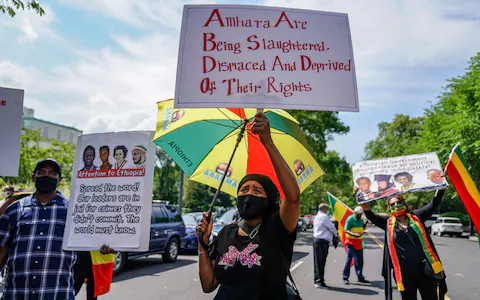The United Nation’s humanitarian chief has called for a full investigation after The Telegraph reported that civilians had suffered horrific injuries consistent with the use of white phosphorus during fighting in northern Ethiopia.
The Telegraph obtained exclusive footage and accounts of witnesses and victims smuggled out of the mountainous region of Tigray showing civilians with burns covering their bodies.
Leading chemical weapons experts said that the wounds were consistent with white phosphorus, which is not considered a chemical weapon but is banned from use against human targets under international law.
“These are alarming reports and they need to be investigated fully,” said Mark Lowcock.
Dr Tedros Adhanom Ghebreyesus, the head of the World Health Organisation and an ethnic Tigrayan, also expressed his horror at the report saying he had “no words” to describe the pain he felt reading the article.
The Telegraph understands that the UK government is also planning to investigate if white phosphorus or incendiary weapons have been used against civilians in Tigray.
“The UK is appalled by reports of atrocities in Tigray, including that civilians have been victims of indiscriminate shelling,” a spokesperson for the Foreign, Commonwealth & Development Office said.
Ethiopia and Eritrea are facing mounting international criticism over reports of alleged war crimes, mass rapes and ethnic cleansing being committed by their forces over the past six months in Ethiopia’s Tigray region.
White phosphorus burns at more than 2,700 degrees Celsius when it comes into contact with air. Like Napalm, it clings to human skin, is almost impossible to put out and it inflicts disfiguring burns.
The incendiary chemical can be used legally to illuminate battlefields or to provide smoke screens. But its use against people can be classified as a war crime under the United Nations’ Geneva Conventions.
Lisa Nandy, Labour’s Shadow Foreign Secretary, said that the report was “deeply shocking” and that it was critical that the claims were “urgently and independently investigated”.
“There can never be any justification for the use of white phosphorus as a weapon against civilians. However they were caused, these horrific injuries are just the latest illustration of how civilians are bearing the brutal consequences of this continuing conflict,” she said.
Other senior international observers have also reacted with horror to The Telegraph report and called for an independent investigation.
“This is a serious, deeply troubling account. It should be thoroughly investigated to confirm its veracity and then weigh potential responses consistent with the law of armed conflict,” said Judd Devermont, Africa head of CSIS, the top-ranked security think tank in the world.
The Ethiopian government rejected any allegations of chemical weapons use. “Ethiopia has not employed and will never use such banned munitions because it takes its international obligations under the Chemical Weapons Convention extremely seriously,” the foreign ministry said in a statement.
Eritrea has not issued any statements on the matter. Neither country has signed the Convention on Certain Conventional Weapons, which bans using incendiary weapons like white phosphorus on people.

